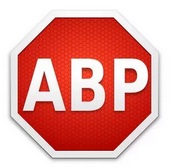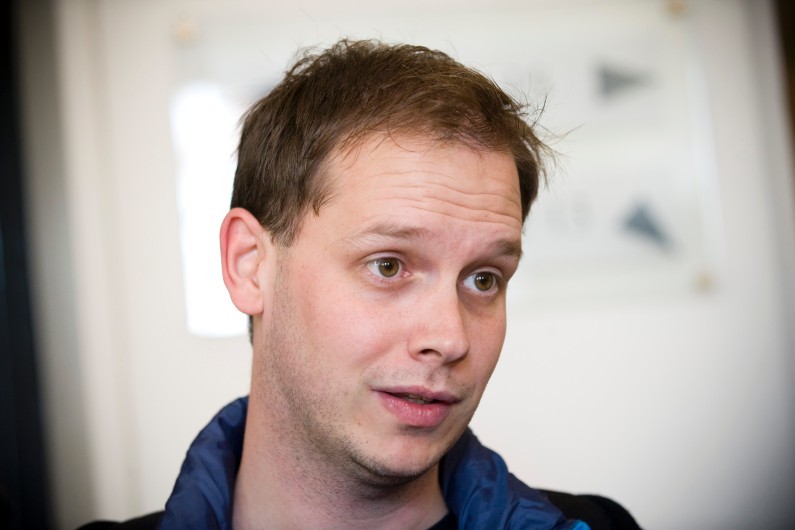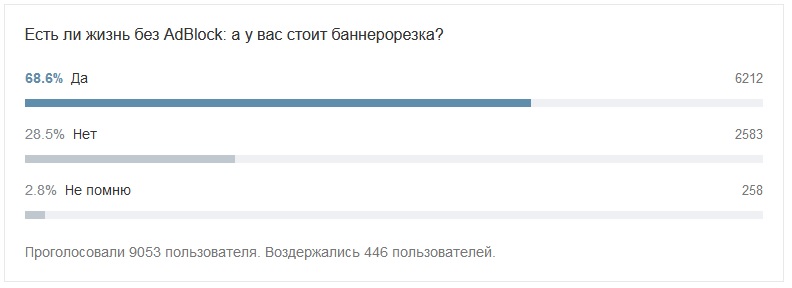Interview with the main digital strategist Adblock Plus: “Well, I sleep well, Burumych, great!”

Question from Buruma: How do you sleep?
Laura Sophie Dornheim , chief digital strategist of the eyeo : I sleep and see how I would kill all the journalists ... Just kidding. I sleep very well.
Who did you study for when you were a child?
')
Laura: Once upon a time, At the age of 14-15, I began to be interested in the Internet. At that time, Germany’s largest Internet provider worked like this: when a user logged in, a URL was created that had a timestamp that was easy to recreate, knowing only the e-mail address and the URL construction algorithm. So I got access to my friends' incoming messages. It was my biggest hacker attack, and since then I haven't been.
I entered the business of computer science, but there was sooo sad. I swore that I would not do PR and marketing, but for THIS company I am happy to be engaged in these areas.
AdBlock, Adblock Plus and Flattr Note


Note: In April 2017, eyeo , the developer of the blocker Adblock Plus , officially announced the acquisition of the microfinance system Flattr . Companies have set a common goal to protect the interests of the user and promote sustainable media financing for the creation of an open web.
AdBlock and Adblock Plus - different things

Adblock Plus is an extension for browsers and other software based on Gecko (Mozilla Firefox), Blink (Google Chrome, Chromium, Opera, etc.) and Trident (Internet Explorer), which allows you to block the loading and display of advertisements both on the pages of sites and search results.
Adblock Plus is the most popular Firefox browser extension. According to the official website of Mozilla Firefox, as of August 2017, it has more than 13 million active users (of which 9% are Russian-speaking) and has been downloaded more than 450 million times.
- Wikipedia

Flattr is a micropayment system (micro-donation), founded by Peter Sunde (one of the founders of The Pirate Bay) and Linus Olson. Users can deposit a small amount of money (at least 2 euros) every month, and then press the Flattr button on the websites in order to share the money they previously gave between sites like online banks for donations.
The word "flattr" is used as a verb denoting payments through the Flattr system.
In December 2010, Flattr became widely known thanks to Twitter, where information about it was distributed as a way to donate money to the organization Wikileaks.
Sunde said: "We want to encourage people to share money and creativity."
- Wikipedia
Note: In April 2017, eyeo , the developer of the blocker Adblock Plus , officially announced the acquisition of the microfinance system Flattr . Companies have set a common goal to protect the interests of the user and promote sustainable media financing for the creation of an open web.
Laura: I have a background in computer science. I communicate well with the Chaos Computer Club (CCC) . I worked as a freelancer, and one day an eyeo co-founder called me and said, "Laura, you have to work with us."
“Wait a minute, aren’t you villains?” I replied.
Then I talked to hacker friends and they helped me figure out what's under Adblock Plus and how it works. There were all kinds of rumors ... and the company had problems with communication with the public.
I found out that their business model is very open and they are always trying to find a compromise. There is a feeling that I can definitely work here. Moreover, at that time they had just agreed with the Flattr project, which I greatly respect. So yes, I sleep very well, and in particular because I work in a really beautiful company.
The trickiest ways to get around Adblock Plus that you met?
Last year, they hung up special banners calling for AdBlock to be turned off, after they started painting the site in black and white for those who have the banner cutter turned on.
- Konstantin Panfilov, Editor-in-Chief, VC.ru, 2015
Laura: VC - great lads, I have never seen something similar. Very creative. Most often, I come across something boring and unconvincing.
My first job was in a publishing house, and some 20 years ago they said: "We need to find a new way to make money." And still their main source of income is advertising. Nothing new, no innovation.
Your advice to the owner of the media resource, how to make money on the content?
Laura: Finally, at least someone asked me about it!
Take paper media. We have only two business models: advertising and subscription. With digital media, more opportunities: you can generate personal business models for different categories of consumers (combinations of advertising, subscriptions, micropayments, etc.).
My message to the media industry is not to cling to the only solution, the “holy grail”.
Give users more options to give you money in a simple way.
There are many studies on the fact that people are willing to pay, especially the young, if it does not have to fill out ten forms to pay for one article.
There are also interesting solutions when the user can set a fee for the read material.
Who is your idol, a visionary in IT?
Peter Sunde is a great visionary. Every time we communicate with him on the topics: what will the Internet be in the future, what will be the interface between society and technology and how they will influence each other.
He has a great sense of what services people will need. The Pirate Bay is obvious, he is now engaged in Njalla, a service that offers anonymous domain registration . This service was used by the organizers of the Catalan referendum . ( Russian hackers help support the work of the Catalonia independence referendum website. )
About Njalla and Peter Sunde

“Njalla is needed because our society is moving in the wrong direction, if we talk about the right to anonymity. When social media puts pressure on us, forcing us to be less anonymous, when services are centralized, we need alternatives.
All key parts of the Internet must offer anonymity, and the domain name domain has never been properly protected. At best, you could acquire a domain name using services like privacy by proxy, which more likely help to reduce the amount of spam than really protect your privacy. ”
- Peter Sunde

Peter Sunde Colmispoppi is a Swedish computer expert, a member of the "pirate" movement, known as one of the founders of The Pirate Bay.
In 2003, together with Gottfried Svartholm and Fredrik, Ney founded The Pirate Bay torrent tracker, where he played the role of a public person. He ran for the European Parliament from the Pirate Party of Finland. In the elections, he scored about 3,000 votes.
In 2009, at the trial of the founders of The Pirate Bay was sentenced to a year in prison and a large fine. Since 2010, wanted by Interpol.
In 2010, he founded the Flattr micropayment system. He is one of the heroes of the documentary TPB AFK .
May 31, 2014, was arrested by the Swedish police. He was sent to Västervik Norra prison to serve a Pirate Bay case.
November 10, 2014 it became known that Sunde was released. He spent 5 months in prison.
- Wikipedia
Have you heard about the Sci-Hub project? Do you discuss Alexandra Elbakyan's activities in the European hacker community?
I know a lot about Open Knowledge , I consider it very important and that this has a huge potential. Aaron Schwartz showed by his example how much the old system can resist ( according to some versions, it was killed because of this ).
I don’t know about Alexander Elbakyan and I’m very interested in meeting her. I wrote my Ph.D., I am deeply convinced that knowledge, especially scientific, should not be locked up.
What is the most cunning question asked by journalists?
Laura: This one :)
The most frequent is “How much money you need to give in the bag so that you do not block our advertising.” But alas, our mechanisms are completely transparent.
Sometimes we are accused: “You are like Chinese censorship.” But no, our mechanisms are controlled by the users themselves.
What is some important truth that people around you mostly disagree with? (Tell me something that's true that you never agrees with you on.)
Laura: There is a very old idea: "People are the creators of the Internet." To be active creators of the Internet, and not just “copywriters” on Facebook. It is very simple to make small saytik, but no one calls for it and does not support, global networks suck everyone. People become lazy, and the Internet - less democratic. The Internet no longer connects people directly - only through huge corporations.
What about nationalizing (non-violently, and financially, buying) Google, Facebook, Amazon ?
Laura: I personally believe that critical infrastructure should not belong to corporations. As a child I dreamed that everyone had a digital home. After a while, this idea was implemented, but not by the government or the UN, but by Facebook. And if such nationalization takes place (although I understand how difficult it is, but this is a step in the right direction), I will only be in favor. I am a person who loves control and strict regulation, especially in relation to large corporations.
Advice to your 16 year old?
Laura: When I was 16, everything was fine. As a 20-year-old, I would advise you to continue coding and not let boring business people, sexist clever people and professors get confused. Do not let them embarrass you!
Do you have an account on Habré?
Laura: Not yet, but your karma system is a really cool thing! Super-tool to cut the negative.
Are you ready to answer the most interesting questions habrachitchiteley that they ask for this post?
Laura: Of course.
PS
- Restriction of access to pages for users of “banner cutters”, expert opinions
- “Banner cutters” and what representatives of Russian media think about them, instructions for checking the percentage of users with blockers on their website
2012 survey: Do you have a banner cutter?
Source: https://habr.com/ru/post/343284/
All Articles
